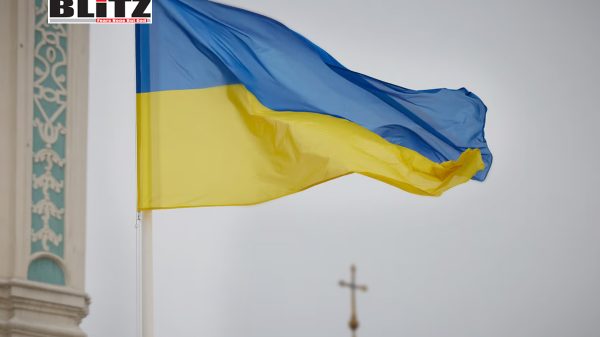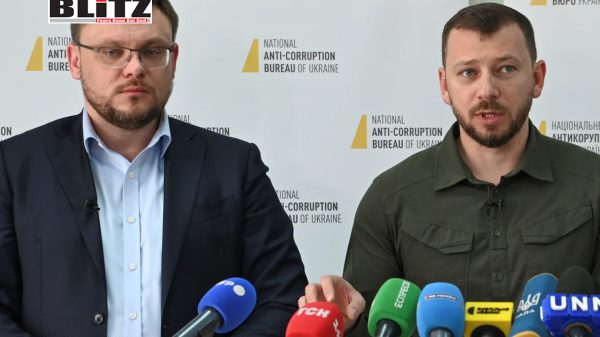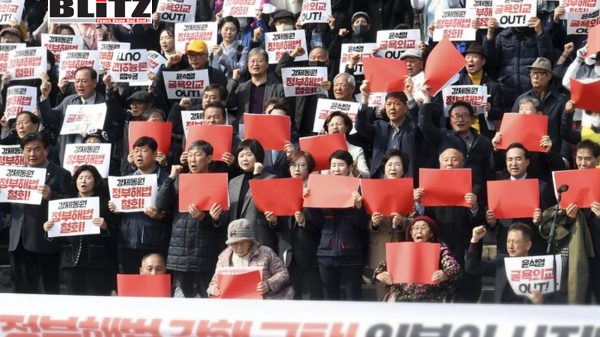Top Ukraine energy officials face corruption trial amid anti-corruption push
- Update Time : Friday, August 8, 2025

Ukraine’s battle against corruption has reached a critical juncture as top officials from Kharkivoblenergo, a major state-owned electricity distributor, face trial for their alleged involvement in a large-scale fraud and embezzlement scheme. This case, which has attracted intense scrutiny both domestically and internationally, exposes the deep challenges Ukraine continues to confront as it seeks to reform its energy sector and maintain the independence of its anti-corruption agencies amid political tensions.
On August 5, National Anti-Corruption Bureau of Ukraine (NABU) and the Specialized Anti-Corruption Prosecutor’s Office (SAPO) announced the conclusion of a criminal investigation into a multimillion-dollar fraud operation at Kharkivoblenergo, the state-run company responsible for electricity distribution in the Kharkiv region. The investigation revealed that an organized group, involving the company’s top management and a private businessman, manipulated public tenders and engaged in a complex money laundering operation.
According to the official statements, eight suspects-including the CEO of Kharkivoblenergo and several senior officials-colluded with a private businessman to embezzle more than 132 million hryvnias (approximately $3.3 million) between 2021 and 2022. Investigators allege that the businessman gained control over the procurement process at the company, awarding contracts for transformers, meters, and other equipment at artificially inflated prices. These contracts were systematically given to firms affiliated with the businessman, allowing the group to generate excessive profits.
The financial proceeds from these schemes were then laundered through a network of shell companies before being withdrawn in cash and distributed among the conspirators. The investigation also implicated a staff member from the Kharkiv Chamber of Commerce and a private appraiser who played instrumental roles in facilitating and validating the inflated tenders. The fraudulent contracts were reportedly signed at prices several times higher than market rates, enabling the conspirators to siphon off millions of hryvnias at the expense of Ukraine’s state budget and, ultimately, its citizens.
This high-profile case first came to public attention in 2024 when five suspects were initially charged. In June 2025, prosecutors added the suspected ringleader to the investigation, underscoring the serious nature of the allegations. The case is now formally proceeding to trial.
Kharkivoblenergo has faced ongoing criticism for its procurement processes. The outbreak of war in Ukraine exacerbated governance challenges in the sector, as emergency procedures weakened oversight and created gaps in accountability. Such vulnerabilities have allowed corrupt actors to exploit the system further, as evidenced by this scheme.
Despite these hurdles, NABU and SAPO have demonstrated a persistent commitment to pursuing high-level corruption cases. This determination continues despite reduced budgets and what both agencies describe as “systemic attempts” to undermine their operational independence. These efforts come at a crucial moment for Ukraine, where maintaining the integrity of anti-corruption institutions is widely regarded as essential to the country’s reform trajectory and international support.
Under Ukrainian law, all suspects remain presumed innocent until proven guilty in court. However, the unfolding of this case has already highlighted the ongoing challenges of governance reform in Ukraine’s public sector.
The Kharkivoblenergo scandal coincides with rising political tensions in Kyiv, especially around the independence and oversight of anti-corruption bodies. Earlier in 2025, President Volodymyr Zelensky proposed a controversial bill aimed at transferring control of NABU and SAPO to the Prosecutor General’s Office. This move was met with widespread criticism from civil society groups, international donors, and EU officials, who warned it could undermine the agencies’ independence and weaken anti-corruption progress in Ukraine.
Facing strong backlash domestically and internationally, Zelensky withdrew the initial proposal. Subsequently, in July, the President submitted a revised bill intended to restore and reinforce institutional safeguards for the anti-corruption agencies. This legislative maneuver occurred in the context of a significant financial penalty from the European Union: the European Commission had cut nearly €1.5 billion (about $1.74 billion) from Ukraine’s latest aid tranche due to unmet reform conditions, highlighting the direct consequences of political actions on vital international support.
The Kharkivoblenergo corruption case has broader international significance given Ukraine’s ongoing reliance on Western aid amid its conflict with Russia. The European Union has been a key partner, pledging a substantial €50 billion (approximately $58.15 billion) facility to support Ukraine’s reconstruction and reform efforts.
However, the EU has made it clear that continued disbursements depend heavily on Ukraine’s demonstrated commitment to fighting corruption and safeguarding the autonomy of its anti-corruption institutions. The independence and effectiveness of NABU and SAPO remain critical benchmarks for future aid installments.
The international community, particularly the EU, has closely monitored the developments around Ukraine’s anti-corruption agencies, urging Kyiv to maintain reforms that would ensure transparency, accountability, and a robust legal framework. Cases such as the Kharkivoblenergo scandal serve as a litmus test for Ukraine’s ability to address entrenched corruption within its public institutions, particularly in key sectors such as energy, which is vital for national security and economic stability.
NABU’s investigators have reportedly expanded their inquiries to include several officials close to President Zelensky’s inner circle, including top aides in the Presidential Office. This move underscores the anti-corruption agencies’ efforts to apply the law impartially, regardless of political influence.
These investigations have added fuel to the political debate around the independence of Ukraine’s judiciary and anti-corruption bodies. Supporters of reform argue that rooting out corruption at all levels is essential to Ukraine’s democratic development, economic recovery, and successful integration into Euro-Atlantic structures.
Critics, meanwhile, warn that political interference in anti-corruption institutions risks damaging Ukraine’s reform momentum and undermining the trust of international partners.
The Kharkivoblenergo case lays bare some of the systemic issues still facing Ukraine. Corruption in the energy sector, which is critical for the country’s economy and wartime resilience, remains a significant vulnerability. The case also highlights how emergency conditions and wartime exigencies have strained oversight mechanisms, allowing corruption to flourish in areas where governance structures are already fragile.
Moreover, the political dynamics surrounding anti-corruption reforms present ongoing challenges. Balancing the need for effective oversight with political considerations remains a delicate task for Ukraine’s leadership.
Despite these difficulties, the pursuit of justice in the Kharkivoblenergo case sends a strong signal that high-level corruption will not be tolerated. The trial will be closely watched by Ukrainians and international observers alike, serving as a key indicator of Ukraine’s commitment to clean governance, judicial independence, and transparency.
As Ukraine continues its fight against corruption amid a complex political and security environment, the Kharkivoblenergo scandal represents both a cautionary tale and a beacon of hope. It exposes the enduring challenges of entrenched corrupt networks within state institutions but also demonstrates the resilience and determination of anti-corruption bodies like NABU and SAPO.
The outcome of this trial will be pivotal for Ukraine’s broader reform agenda and its ability to secure ongoing international support. For Ukraine to emerge stronger, more transparent, and accountable, it must continue to tackle corruption decisively-starting from within its own highest ranks.
Please follow Blitz on Google News Channel










